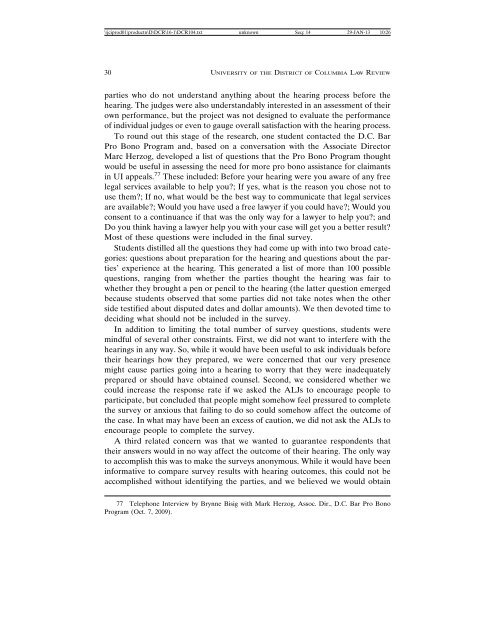THE PLURAL OF ANECDOTE IS NOT DATA:1 ... - UDC Law Review
THE PLURAL OF ANECDOTE IS NOT DATA:1 ... - UDC Law Review
THE PLURAL OF ANECDOTE IS NOT DATA:1 ... - UDC Law Review
You also want an ePaper? Increase the reach of your titles
YUMPU automatically turns print PDFs into web optimized ePapers that Google loves.
\\jciprod01\productn\D\DCR\16-1\DCR104.txt unknown Seq: 14 29-JAN-13 10:2630 UNIVERSITY <strong>OF</strong> <strong>THE</strong> D<strong>IS</strong>TRICT <strong>OF</strong> COLUMBIA LAW REVIEWparties who do not understand anything about the hearing process before thehearing. The judges were also understandably interested in an assessment of theirown performance, but the project was not designed to evaluate the performanceof individual judges or even to gauge overall satisfaction with the hearing process.To round out this stage of the research, one student contacted the D.C. BarPro Bono Program and, based on a conversation with the Associate DirectorMarc Herzog, developed a list of questions that the Pro Bono Program thoughtwould be useful in assessing the need for more pro bono assistance for claimantsin UI appeals. 77 These included: Before your hearing were you aware of any freelegal services available to help you?; If yes, what is the reason you chose not touse them?; If no, what would be the best way to communicate that legal servicesare available?; Would you have used a free lawyer if you could have?; Would youconsent to a continuance if that was the only way for a lawyer to help you?; andDo you think having a lawyer help you with your case will get you a better result?Most of these questions were included in the final survey.Students distilled all the questions they had come up with into two broad categories:questions about preparation for the hearing and questions about the parties’experience at the hearing. This generated a list of more than 100 possiblequestions, ranging from whether the parties thought the hearing was fair towhether they brought a pen or pencil to the hearing (the latter question emergedbecause students observed that some parties did not take notes when the otherside testified about disputed dates and dollar amounts). We then devoted time todeciding what should not be included in the survey.In addition to limiting the total number of survey questions, students weremindful of several other constraints. First, we did not want to interfere with thehearings in any way. So, while it would have been useful to ask individuals beforetheir hearings how they prepared, we were concerned that our very presencemight cause parties going into a hearing to worry that they were inadequatelyprepared or should have obtained counsel. Second, we considered whether wecould increase the response rate if we asked the ALJs to encourage people toparticipate, but concluded that people might somehow feel pressured to completethe survey or anxious that failing to do so could somehow affect the outcome ofthe case. In what may have been an excess of caution, we did not ask the ALJs toencourage people to complete the survey.A third related concern was that we wanted to guarantee respondents thattheir answers would in no way affect the outcome of their hearing. The only wayto accomplish this was to make the surveys anonymous. While it would have beeninformative to compare survey results with hearing outcomes, this could not beaccomplished without identifying the parties, and we believed we would obtain77 Telephone Interview by Brynne Bisig with Mark Herzog, Assoc. Dir., D.C. Bar Pro BonoProgram (Oct. 7, 2009).














